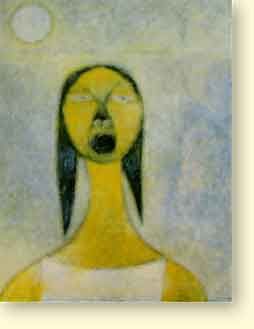 | Awit Arturo R. Luz 1953, Oil on Lawanit 48 x 37.5 cm Ateneo Art Gallery Collection |
one of the things that interests young filipino americans here in chicago is the country of their parents. one of my friends, d, visited his father's province in northern luzon this past summer. as part of a freelance video project, he interviewed his neighbor elvie, a high school graduate with plans to go abroad to work. here follows an excerpt of their hourlong conversation. they are talking on the top floor of an abandoned house near the outskirts of town. elvie wants to go to japan, but not manila:
So Japan or Taiwan is where you want to go now.
(tumango) Nods.
Have you ever thought of going to Manila? First, before you head to Japan or Taiwan?
(nods, makes a small face) Sa Manila naman, I mean, there’s so much freedon on it di ba – andaming freedom doon, and then , andun lahat, it’s up to you kung pipiliin mong mapasama ka, or piliin mong mapabuti yung buhay mo doon. Kasi sa freedom na yun, kumbaga hindi mo, hindi, hindi, alam mo yun andami dun eh, termptations, a lot of , I mean andun yung drugs, lahat-lahat, temptations, rightly. nightlife, andun din, magulo din.
In Manila, on the other hand, there’s so much freedom, right – there’s so much freedom there, everything is there, it’s up to you whether you choose to better or life or not. You never know with that freedom, there’s so many temptations, there’s drugs, everything, right, nightlife, and it’s also crazy hectic there.
Do you have friends in Manila right now?
Uh - hmm
Can you describe the life of your friends in Manila?
(laughs, doesn’t talk)
How does it feel to have some of your classmates leave Camalaniugan?
Pag bumalik na sila, mas liberated na silang magsalita. (laughs) Siguro mas open na yung mga isip at puso nila sa mga… siguro they’re more fashionate, mas… ok na, pag nandun ka, mas maimprove mo yung pananamit mo, yung pananalita mo, yung lahat, puwede ka ring matutong manigarilyo dun, kasi malayo ka sa mga magulang mo, di ba, kasi nandun lahat. (laughs)
When they return, their speech is much more liberated. Maybe they’re more open in their thoughts and hearts. They’re more fashionable. When you’re in Manila, you can improve the way you dress, your speech, everything. You can even learn how to smoke there, because you’re far from your parents, right, because everything is there.
Let’s go back then, and talk about life in the Philippines, especially here in the province – can you describe for your families, not just for your own family, but for your family, especially for Fil-Ams, how would you describe the province?
(pauses) Ang pamumuhay kasi dito kasi simpleng simple lang siya, kaya lang, pag ipinanganak ka dito na isang kahig isang tuka lang, siguro pag hindi ka gumawa ng effort mo na hindi ka mangarap, wala kang pangarap, na mabago yung lifestyle mong yun, siguro, wala kang comment, I mean, dito ka lang. Siguro kuntento ka na sa ganung pamumuhay, wala kang reklamo, di ba, pero pag ikaw yung tao na gusto mong magbago yung lifestyle mo, yung pamumuhay nyo, yung may pangarap ka, na hindi lang hanggang dito, kasi dito – there’s a little progress on it, I mean, ambagal ng pagprogresso dito. So.
Life here in the province is so simple, when you’re born here, it’s hand to mouth if you make no efforts, if you don’t dream of a better lifestyle, you’ve no comment, and you remain here. Maybe that life suits others, but if you’re one who wants to change your lifestyle, and you have dreams that go beyond here – because here, there’s little progress, I mean, progress is extremely slow here. So.
What does the province need, then? What are some of the things the province need to improve?
(pagod na siya) Siguro yung mga tao, kailangan mo nila, kailangan, iaccept din nila yung pagbabagong yun, di ba, yung kasi minsan ang ibang tao takot sa pagbabago, alam mo yun takot sa, anong tawag dito, andami pa ring taong gusto sa, alam mo yun –
Maybe for the residents, they need to accept change. Some people are afraid of change, you know.
What do you know about others’ experiences abroad – what are their impressions? Why is it like that?
(pauses, smiles) Nauubusan na akong sasabihin. I mean, bakit andaming - kasi pag Filipino na yung nagabroad, di ba, yung basic nilang trabaho doon, is a domestic helper one, so –
I’m running out of things to say. I mean, why is there – when Filipinos go abroad, right, their basic work is a domestic helper, so –
Did you know that the dictionary in the U.S., I think it’s the Oxford dictionary, the word for Pinay is – instead of saying a woman from the Philippines, it’s says "Pinay: Domestic worker." (1) That’s our impression, di ba, so what are some of the things that we can do to change people’s view of who we are?
Kami – ako kasi, di ko rin masasabi, kasi kapag nagabroad ako, I think, yun din, to be a domestic helper, no choice eh. You got to choice. I mean, walang nang options na iba. Yun na lang yung easiest way na magagawa namin. Di naman kami puweding maging doktora doon, di naman kami puweding maging ano kasi di ba they won’t (laughs) – so that’s it, so yun, kahit na siguro ano pang sabihin nila, kahit na ano pang discrimination na matatanggap namin, we’re willing to take the risk, kasi kailangan nga, iniisip namin yung hirap, yung hirap – gaya ko, pag nakaalis ako, siguro kahit na anong risk ang madadatnan ko doon, kahit anong hirap yung dadtnan ko doon, ok lang, kasi iniisp ko yung hirap dito eh, ayoko nang - magkaroon man akong among masungit, or ano, titiisin ko siguro, kasi iniisiip ko yung pamilya ko dito. Kailangan kong magsacrifice, kailangan yung mga pangarap ko sa kanila, magawa ko. Eh kung matatakot ako sa mga risks na yun, walang mangayayari sa akin, hindi ko magagwa yung mga pangarap kong yun, di ba.
Ang sarap ang sarap, magistay sa sarili mong bansa, di ba, nang wala, nang hindi na mo kailangan i-please yung, iba, kasi pare-pareho kayong Pilipino, eh di ba, ang sarap pa ring mamuhay, kahit na siguro mahirap ka rin din dito, at least hindi siya gaya nang pag nasa ibang bansa ka, hindi mo, hindi, mo, hindi mo, ikaw, yung parang ikaw lang yung toy nila doon eh, parang, yung "you don’t belong here," yung ganoon sila, na, "sa amin 'to," parang yung parang "you’re just a slave." Yung ganoon.
Kaya siguro hindi mo rin mable-blame yung iba na, kahit na siguro kahit na ganon na, tinetake pa rin nila yung ganoon kasi sa hirap ng buahy dito, yung effort namam na yun yung in return, di ba. may ipapadala sila sa pamilya nila dito, Big help na yun.
We – me, I also can't say, because when we go abroad, I think, it's also that, to be a domestic help, because I have no choice. I have no choice. I mean, there aren’t any more options out there. It is the easiest way for us. We can’t be a doctor, we can’t be anything else because they won’t (laughs). So whatever they say, what other discrimination we receive, we’re willing to take the risk, because we think of the difficulties here and need to improve our lives here. Like me, when I leave, whatever risk I’ll encounter, whatever difficulties, I think of the hardships here, and I think, it’s ok. Even if I end up having a difficult boss, I’ll endure it, because I’m thinking of my family here. I need to sacrifice, I need to fulfill my dreams for them. If I fear the risks, nothing will happen to me, I will never fulfill those dreams, right.
It is so sweet to stay in your own country, right, without trying to please anyone, because all of you are Filipino, right, it is still so sweet to live here, even if it’s difficult. It’s not like in another country, where you’re like just like their toy, where they tell you, "you don’t belong here," where they tell you, "this is ours," as if they tell you, "you’re just a slave." Like that.
So maybe that’s why you can’t blame the others, that even if they’re treated like that, they take it, because they know how difficult it is here. Their efforts, in return, they can send something back to their families. That’s already a big help.
Is there anything you want to say to those who’ve migrated abroad? To those who were born abroad?
(laughs) Those how were born abroad already na – you are lucky, lucky kayo kasi ‘cause, I mean, be thankful sa parents ninyo, di ba, kasi they’ve done that effort na ipanganak kayo doon, hindi nyo na kailangan makita yung hardship dito sa Pilipinas, hindi nyo na kailangan pa sigurong daanan yung maging TNT ka muna, then pag nandun ka tsaka magpapasakal nang ganito, kasi citizen na kayo, so pangalagaan nyo’ng pagiging citizen nyo and then try to look back sa culture na ‘Pinas – na pinagmulan nyo.
Try to look back lang, hindi mo lang, wag mo lang siyang itapon na you’re a Fil-Am. So you’re lucky, man. lucky kayo, okay, so be thankful sa mga magulang nyo.
Just try to look back, just don’t disregard that you’re Fil-Am. So you’re lucky, man. You are lucky, okay. So be thankful to your parents.
And um, siguro, sa lahat sa aming magkakapatid, ako na lang yun - wala na, eh, yung ate ko, may kanya-kanya na silang buhay, so kailangan kong magpatuloy, so kailangan kong iresacrifice yung lahat.
(Laughs) Those who were born abroad already – you are lucky. You are lucky because, be thankful to your parents, because they’ve accomplished that you were born there, you don’t need to see how hard it is here in the Philippines, you don’t need to hide first and then get married to a citizen because you’re already a citizen. So take care of your citizenship, then try to look back on the culture that is the Philippines.
I’m not saying I’m not lucky, because I was born here, I was born poor, or what. No. I’m still lucky because my mother molded us, because even if there’s 13 of us in the family, she tried her best to keep us together, she never gave any of us up for adoption, I mean, she tried everything, her best, that we all stay there in one house, not like the others, they were given away. Think of that, right, 13! So there.
And I think, of all of us siblings, I’m the only one left. There’s no one else – my older sister already has her own lives, so we need to continue. So I need to sacrifice everything.
So Elvie, describe to me, what does it mean to dream?
Pag nangarap ka kasi kailangan niyang, kailangan anong tawag dito, pag mangapara ka, kailangan may action doon, di lang yung simply dreaming and then you’re not making any move to it. So try to look for, I mean, try mong makamit yung pangarap na yan, magmove on ka, I mean, keep an action on it, not just simply dreaming, so pag may pangarap ka, hindi ka, you must be a risk taker, and then, pag may pangarp ka sa buhay wag mong alisin yung hope di ba, yung belief sa sarili mo, self-confidence din, and asking the guidance of our Lord.
When you dream, there needs to have, what it’s called, when you dream, you need action, not just simply dreaming and then you’re not making any more to it. So try to look for ways to achieve those dreams, to move on, to keep the momentum, and not just simply dreaming. So when you have a dream, you must be a risk taker, don’t loose hope, believe in yourself, have self-confidence, and ask the guidance of our Lord.
(Camera pans to the far-off fields.) Can you look in front of you?
Minsan pag nangarap kami, or pag nagbibiruan kami ng pinsan ko, sinasani naming, lahat ng kung saan nang makita ng mga mata ko, na pagaari namin, na someday I’m going to own all – (laughs, waves arms to the sky)
Sometimes, when we dream, or when my cousins and I joke, we say we own, everything, all this, as far as our eyes can see. That someday, I’m going to own all of this.
Why do you come up here?
Whenever I get a problem, I’ll just run here and stay here and stay up in these buildings, and I’m keeping my dreams too – parang ang relax-relax ko dito, feeling ko parang lahat niyan akin, parang nakakakrelieve, yung katahimikan, yung walang nambubulabog sa yo, and then iniisip ko kung ano yung next move ko, I mean nandiyan lang ako nakaupo, tinitignan ko lang lahat.
Tatlong oras akong nakaupo diyan, sometimes I sit there for three hours, me alone, sitting there and having my own thoughts. Kapag nandiyan ako inisisp ko parang ang layo-layo ko sa problema.
Whenever I have problems, I’ll just run here and stay here and dream – I feel so relaxed here, I feel as if I own all this. The peace and quiet is relaxing. No one bothers me here, and I get to think of my next plans. I mean, I just sit there, looking at everything.
I sit there for three hours, sometimes I sit there for three hours, just me, sitting there and entertaining my own thoughts. When I sit there, I think my problems seem so far from me.
(d is quiet. elvie waves her arms around.) Someday, I’m going to build a house like this, (laughs) if it’s God will.
(d points to the distance) Where’s it going to be – over there?
Maybe. (laughs)
---
(1) if someone can verify this for me, i'd be grateful. i haven't been able to find a dictionary, online or print, that says so.






